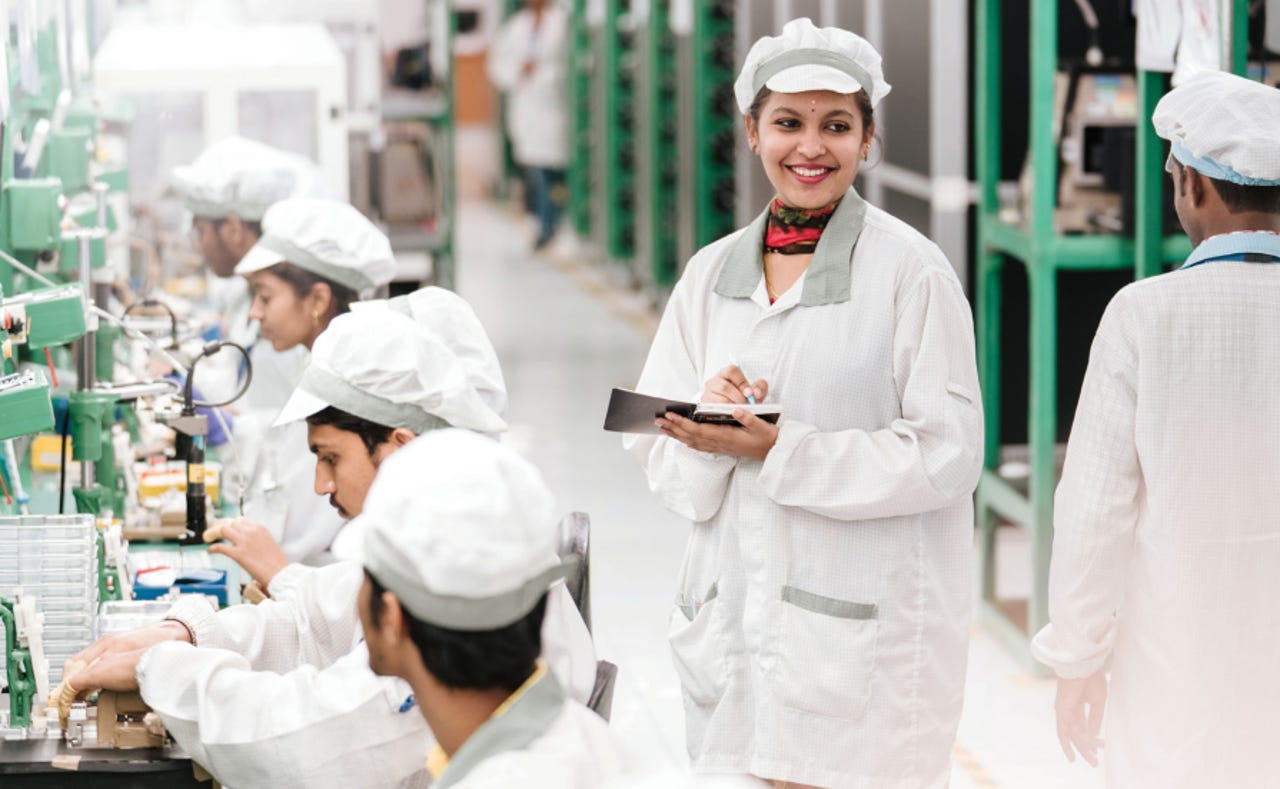Apple's annual supply chain probe touts focus on individuals' well-being


iPhone production line in India
Apple has released its annual Supplier Responsibility Progress Report, with the 2018 update painting a picture of an organisation that wants to be known for how it treats those working throughout its supply chain.
Its report [PDF], Apple said treating people with dignity and respect, providing advancement opportunities, and implementing responsible practices throughout its supply chain to make a positive impact on employee well-being are fundamental to how an Apple product is made.
"Apple is dedicated to empowering those who work in our supply chain with opportunities to receive an education and advance their careers," it says in the report. "We also work to ensure they are provided a safe and healthy workplace, where their rights are respected and they are treated with dignity."
Where people are concerned, Apple highlighted a handful of "achievements", such as having trained over 3 million supplier employees on their rights, including local labour laws, and Apple's Supplier Code of Conduct.
The company's Supplier Employee Training Program was launched in 2008, and covers standard human rights such permissible working hours, proper working and living conditions, and fundamental health and safety information.
The total number of individuals informed of their rights through the program now sits at 14.7 million.
Bonded labour, where a person is forced to work in exchange for the repayment of a debt or other obligation, was highlighted by Apple in 2008 as something it would not tolerate in its supply chain.
In 2015, Apple then mandated that zero fees can be charged to supplier employees for recruitment opportunities, even if those fees fall within the legal limits of the supplier's operating country. If bonded labour is discovered, the supplier is required to repay the recruitment fees in full to all impacted employees.
With that, $1.9 million was paid to 1,558 individuals by suppliers as a result of bonded labour violations in 2017, bringing the total to $30 million repaid to over 35,000 employees since the program started.
Apple also assessed 756 facilities and nearly 1.3 million people last year and uncovered two cases of underage labour. The two underage employees were 14 and 15-years-old and according to the tech giant, in both cases, individuals used false identification to gain employment.
The two individuals were then returned home and enrolled in school, and continued to be paid their respective wages.
During 2017, Apple also launched an initiative intended to empower women through health education at several of its supplier facilities in China and India.
"Our goal is to enable women in factories to take charge of their personal health and well-being by becoming well-informed of risks specific to women," it says in its report. "Our curriculum provides vital information and access to services that women need to maintain their health, including critical topics such as self-examination for early cancer detection, nutrition, personal care, and maternal health."
Other 2017 people-focused achievements were highlighted as the launch of Apple's Factory Line Leader Program, which seeks to provide vocational training students with the technical and soft skills it believes necessary to become qualified line leaders; as well as the introduction of a vocational certification program for workers who aren't interested in studying for a degree, but would like to grow more job-based skills.
The former initiative is part of the Supplier Employee Education and Development (SEED) program launched also in 2008.
Labelling conserving the planet's resources as fundamental, Apple reported that as of 2017, 100 percent of iPhone final assembly facilities were zero waste certified.
Apple reported its supplier partners achieved freshwater savings of 5.1 billion gallons in 2017, marking 13.6 billion gallons of water saved since the program was established in 2013.
During 2017, Apple conducted 756 assessments in 30 countries, covering 95 percent of its total spend. In addition, 26 percent were first-time assessments, Apple said.
The company also boosted the number of "high-performing" suppliers by 35, and reported through a different metric the reduction of "low-performers" by 71 percent.
Related Coverage
Apple reportedly looking to buy cobalt directly from miners
The metal is essential to production of batteries for phones and electric cars.
Greenpeace: Apple is green, but there's a greener smartphone maker
Greenpeace's Guide to Greener Electronics 2017 give Apple a B- on its report card, ahead of the likes of Dell, HP, Samsung, and Amazon. But the top spot goes to a company you may not have heard of.
Apple's floating solar island brings renewable energy to Japan
The project is coming to Japan as part of Apple's supplier clean energy program.
Apple to build 200MW solar farm in Nevada
The new plant will help the tech giant reach its goal to use only sustainable energy.
SAP Ariba looks to redefine 'good' with supply chain transparency (TechRepublic)
With an estimated 20-30 million forced labourers in global supply chains, SAP Ariba is leveraging its network and the cloud-based applications delivered on it to help companies determine where they might be exposed to the risk of slave labour and take action to wipe it out.